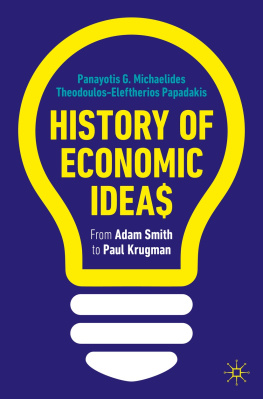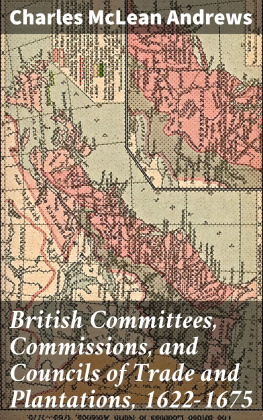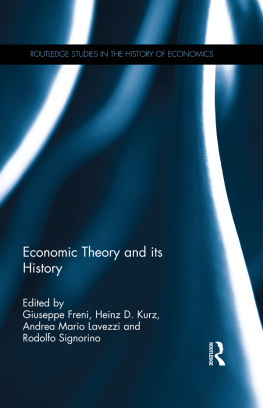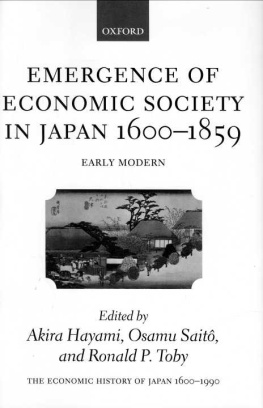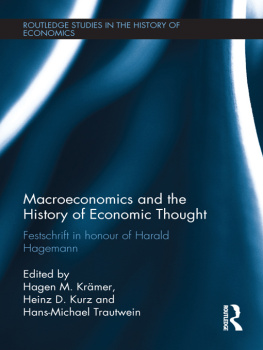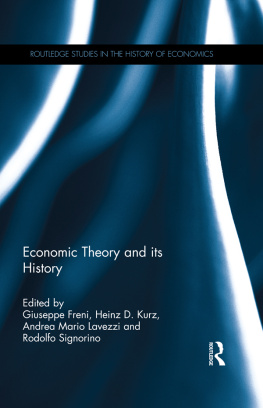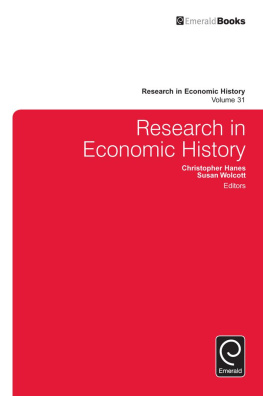Roger E. Backhouse - The Penguin History of Economics
Here you can read online Roger E. Backhouse - The Penguin History of Economics full text of the book (entire story) in english for free. Download pdf and epub, get meaning, cover and reviews about this ebook. year: 2002, publisher: Penguin, genre: Politics. Description of the work, (preface) as well as reviews are available. Best literature library LitArk.com created for fans of good reading and offers a wide selection of genres:
Romance novel
Science fiction
Adventure
Detective
Science
History
Home and family
Prose
Art
Politics
Computer
Non-fiction
Religion
Business
Children
Humor
Choose a favorite category and find really read worthwhile books. Enjoy immersion in the world of imagination, feel the emotions of the characters or learn something new for yourself, make an fascinating discovery.

- Book:The Penguin History of Economics
- Author:
- Publisher:Penguin
- Genre:
- Year:2002
- Rating:4 / 5
- Favourites:Add to favourites
- Your mark:
- 80
- 1
- 2
- 3
- 4
- 5
The Penguin History of Economics: summary, description and annotation
We offer to read an annotation, description, summary or preface (depends on what the author of the book "The Penguin History of Economics" wrote himself). If you haven't found the necessary information about the book — write in the comments, we will try to find it.
The Penguin History of Economics — read online for free the complete book (whole text) full work
Below is the text of the book, divided by pages. System saving the place of the last page read, allows you to conveniently read the book "The Penguin History of Economics" online for free, without having to search again every time where you left off. Put a bookmark, and you can go to the page where you finished reading at any time.
Font size:
Interval:
Bookmark:
PENGUIN BOOKS
The Penguin History of Economics
Roger E. Backhouse was born in Suffolk in 1951 and educated at the universities of Bristol (B.Sc. in Economics and Economic History) and Birmingham (Ph.D. in Economics). Since 1996 he has been Professor of the History and Philosophy of Economics at the University of Birmingham, where he has taught since 1980. Previously he taught Economics at University College London (19757) and the University of Keele (19779). From 1998 to 2000 he held a British Academy Research Readership. He has also taught courses in the history of economics at the universities of Bristol, Buckingham and Oporto. He is Associate Editor of the Journal of the History of Economic Thought and Editor of the Journal of Economic Methodology. As well as contributing articles on economics to numerous journals, he is the author and editor of many books, including A History of Modern Economic Analysis (1985), Economists and the Economy (1988; second edition, 1994), Keynes: Contemporary Responses to the General Theory (1999), Exemplary Economists (co-editor with Roger Middleton, 2000) and Toward a History of Applied Economics (co-editor with Jeff Biddle, 2000).
Roger E. Backhouse

PENGUIN BOOKS
PENGUIN BOOKS
Published by the Penguin Group
Penguin Books Ltd, 80 Strand, London WC2R 0RL , England
Penguin Group (USA) Inc., 375 Hudson Street, New York, New York 10014, USA
Penguin Books Australia Ltd, Ringwood, Victoria, Australia
Penguin Books Canada Ltd, 10 Alcorn Avenue, Toronto, Ontario, Canada M4V 3B2
Penguin Books India (P) Ltd, 11 Community Centre, Panchsheel Park, New Delhi 110 017, India
Penguin Books (NZ) Ltd, Cnr Rosedale and Airborne Roads, Albany, Auckland, New Zealand
Penguin Books (South Africa) (Pty) Ltd, 24 Sturdee Avenue, Rosebank 2196, South Africa
Penguin Books Ltd, Registered Offices: 80 Strand, London WC2R 0RL , England
On the World Wide Web at www.penguin.com
First published 2002
Copyright Roger E. Backhouse, 2002
All rights reserved
The moral right of the author has been asserted
Except in the United States of America, this book is sold subject to the condition that it shall not, by way of trade or otherwise, be lent, re-sold, hired out, or otherwise circulated without the publisher's prior consent in any form of binding or cover other than that in which it is published and without a similar condition including this condition being imposed on the subsequent purchaser
ISBN: 978-0-14-193743-4
Most of this book was written during my tenure of a British Academy Research Readership from 1998 to 2000. I am grateful to the British Academy for its support, and to several colleagues who read various drafts of the manuscript and whose detailed comments have helped me remove many errors and improve the argument. These are Mark Blaug, Anthony Brewer, Bob Coats, Mary Morgan, Denis O'Brien, Mark Perlman, Geert Reuten and Robert Swanson. I also wish to thank those subscribers to the History of Economics Society's email list who answered my requests for bits of information (usually dates) that I could not find myself (Bob Dimand proved a mine of information). I am also very grateful to Fatima Brando and Antonio Amoldovar for inviting me to teach a course at the University of Oporto, which helped me to sort out my ideas on how to organize the material in the second half of the book. Stefan McGrath, at Penguin Books, encouraged me to embark on this project, and was patient when I overshot the initial deadline by a long time. He also provided helpful suggestions, as did Bob Davenport, whose editing of the final draft was exemplary and saved me from many mistakes. None of these people, of course, bears responsibility for any errors that may remain. Last, but definitely not least, I would like to thank my family: Alison, Robert and Ann.
This book is about the history of attempts to understand economic phenomena. It is about what has variously been described as the history of economic thought, the history of economic ideas, the history of economic analysis, and the history of economic doctrines. It is not, except incidentally, concerned with the economic phenomena themselves, but with how people have tried to make sense of them. Like the history of philosophy or the history of science, this is a branch of intellectual history. To illustrate the point, the subject of the book is not the Industrial Revolution, the rise of big business or the Great Depression it is how people such as Adam Smith, Karl Marx, John Maynard Keynes and many lesser-known figures have perceived and analysed the economic world.
Writing the history of economic ideas involves weaving together many different stories. It is clearly necessary to tell the story of the people who were doing the thinking the economists themselves. It is also necessary to cover economic history. Natural scientists can assume, for example, that the structure of the atom and the molecular structure of DNA are the same now as in the time of Aristotle. Economists cannot make comparable assumptions. The world confronting economists has changed radically, even over the past century. (Maybe there is a sense in which human nature' has always been the same, but the precise meaning and significance of this are not clear.) Political history matters too, for political and economic events are inextricably linked, and economists have, as often as not, been involved in politics, either directly or indirectly. They have sought to influence policy, and political concerns have influenced them. Finally, it is necessary to consider changes in related disciplines and in the underlying intellectual climate. Economists' preconceptions and ways of thinking are inevitably formed by the culture in which they are writing. The history of economics has therefore to touch on the histories of religion, theology, philosophy, mathematics and science, as well as economics and politics.
What makes the problem difficult is that the relationships between these various histories are not simple. There is no justification for claiming, for example, that connections run solely from economic or political history to economic ideas. Economic ideas feed into politics and influence what happens in the economy (not necessarily in the way that their inventors intended); the three types of history are interdependent. The same is true of the relationship between the history of economics and intellectual history more generally. Economists have sought to apply to their own discipline lessons learned from science whether the science of Aristotle, Newton or Darwin. They are influenced by philosophical movements such as those of the Enlightenment, positivism or postmodernism, as well as by influences of which we are completely unconscious. However, links also run the other way. Darwin's theory of natural selection, for example, was strongly influenced by the economic ideas of Malthus. In short, economic ideas are an integral component of culture.
One factor that contributes to the interdependence of economics and other disciplines and intellectual life in general is that, at least until recently, economics was not an activity carried out by a group of specialists called economists. Modern disciplinary boundaries simply did not exist; also, the role of universities in society has changed almost beyond recognition. The people responsible for developing economic ideas included theologians, lawyers, philosophers, businessmen and government officials. Some of these held academic positions, but many did not. For example, Adam Smith was a moral philosopher, and his economic ideas formed part of a much broader system of social science, rooted in moral philosophy. Furthermore, the people who wrote the conventional canon of economic literature occupied various positions in the societies in which they lived, which means that comparisons across time have to be made with great care. When the thirteenth-century writer Thomas of Chobham wrote about trade and finance, he was offering guidance for priests taking confession. Perhaps the present-day counterpart to his work should be sought not in modern academic economics, but in papal encyclicals. Gerard Malynes and Thomas Mun, both of whom wrote in seventeenth-century England and are considered to have contributed to our understanding of foreign trade and exchange rates, were respectively a government official and a merchant. Perhaps they should be considered the forerunners of people like Jacques Polak at the International Monetary Fund, or the financier James Goldsmith.
Next pageFont size:
Interval:
Bookmark:
Similar books «The Penguin History of Economics»
Look at similar books to The Penguin History of Economics. We have selected literature similar in name and meaning in the hope of providing readers with more options to find new, interesting, not yet read works.
Discussion, reviews of the book The Penguin History of Economics and just readers' own opinions. Leave your comments, write what you think about the work, its meaning or the main characters. Specify what exactly you liked and what you didn't like, and why you think so.

